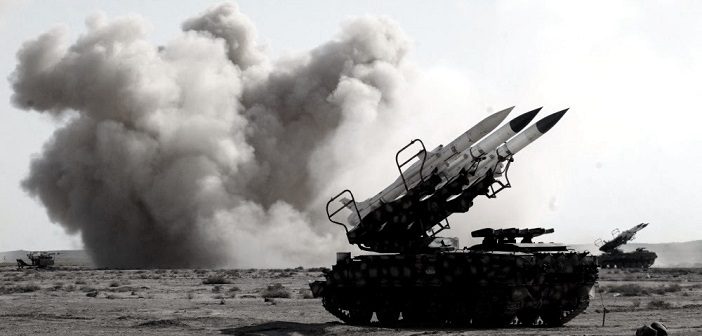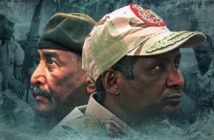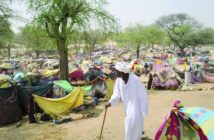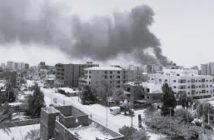The vast majority of western and alternative media organisations have been celebrating the coming of an end of the Islamic State which they hoped would wind down the civil war. Mounting foreign meddling has prevented that from happening, with casualty numbers soaring in the first month and a half of 2018.
The beginning of February 2018 has been increasingly dreadful for the civilian population and armed forces on all sides on the conflict. The NATO member Turkey has teamed up with various Jihadi groups to crush Kurdish forces in the small Afrin canton in the north-west. The battle has been slow during the (ironically) called “Olive Branch Operation”. The Kurdish YPG has stood its ground and deployed many of its anti-tank missiles to counter the advance.
Groups with clear al-Qaeda orientation, such as Ahrar as-Sham and Nour ad-Din az-Zinki are spearheading the offensive. It’s the second time Turkey has teamed up with these notorious groups; during the operation “Euphrates Shield” in 2015, it was they whom Turkey used as proxies to prevent the Kurds linking up between Rojava in the east and Afrin on the west.
This time it seems that Turkey has deployed more troops on the ground, which has inevitably led to more casualties. On a single day the 10th of February eleven Turkish soldiers died.
Russia isn’t spared either
Russia has also been dragged deeper.
While aiding regime forces advancing on rebels in Idlib province, one Sukhoi airplane was downed by a shoulder-launched surface-to-air missile the 3th of February. The pilot ejected, but after a brief gunfight while being surrounded, he blew himself up with a grenade rather than be taken captive.
The downing led to Russia restructuring its aerial defence system in the region, which also brought a halt to the nearby Turkish air operations for three days until the system was set-up. A day after the relaunch of the Turkish aerial campaign, Kurdish forces downed a helicopter, killing both of its pilots, which led to further escalation.
The before-mentioned eleven Turkish soldiers killed was part of this devastating Syrian domino.
Bashar ups the pressure in the East
The ever more grinding battle in the West was followed by even more complex developments in the East and South of the country.
The Syrian regime inner-circle has decided to put American forces on the ground with the Kurdish Syrian Democratic Forces (SDF) to the test. East of the Euphrates river, near to Deir ez-Zor, regime affiliated forces launched a daring raid to try to capture Conoco, one of Syria’s biggest oil fields, controlled by the SDF. The offensive was led by a variety of tribesmen, the Russian trained and equipped “ISIS hunters” along with National Defence Forces (NDF) operating in the area.
The result was devastating for the loyalists, who didn’t expect such a fierce response by American airplanes and artillery. Between 30-100 soldiers lost their lives.
The Pentagon argued that such retaliation was needed for the safety of US special forces on the ground with the SDF. On the other hand, the Kremlin stated that they had no knowledge about the offensive and urged the US to deescalate. One has to admire the recklessness of the advancing troops, who knew that if spotted and attacked by the American Coalition, they would not stand to be a match.
A changing regime strategy?
Until February, Bashar al-Assad has continued his father’s pragmatism in not provoking and dragging Israel and its more powerful allies to an open confrontation. But it seems that with the escalation in other fronts of the war, the regime felt a need to flex its muscles.
So, the Syrian regime possibly launched a sophisticated operation in the South against Israel, which has been illegally launching airstrikes on loyalist forces for years. In the early morning on the 10th of February, an Iranian-made drone crossed the southern border into Israel (according the Israeli government; Teheran denies). This provoked the usual coupled with more than reasonable Israeli counter-attacks…
Moments after the drone was shot down by an attack helicopter, F16 aircrafts began the retaliation, not knowing that they were heading straight into what could have been a trap: a massive barrage of Syria’s S-200 air defence system spotted one of the attacking planes and brought it down deep within Israeli territory.
Celebration ensued both in Damascus and Beirut with handing out candies to civilians. Israel’s response was the usual; several Syrian airbases and missile launchers were damaged by the ensuing retaliation.
While the regime has successfully done so against Israel (following our hypothesis), it has failed with regards to the SDF and Coalition. Even though, the regime has proved that it’s still capable of damaging its more advanced adversaries. It has an open-door policy to Kurdish fighters from SDF’s Rojava canton, who can cross through regime territory into Afrin which is being attacked. It has also deployed Shi’ite militias into the same area, trying to botch-down Turkey.
The complexities of the civil-war keep mounting.
* * *
Thus far, the winner is Bashar al-Assad who has successfully shattered the thesis that Putin has total control over him. It’s unlikely that the Kremlin gave its accord for the attack on both the allies of the Coalition and Israel a few hours apart.
Turkey’s offensive against the Kurds is slow and under international scrutiny. Russia will continue to aid Assad, while the Coalition is under pressure by the remnants of the Islamic State and worried of Turkey’s incursion. The Kurds feel rightfully abandoned.
As usual, it’s the civilians who pay the biggest price. They’re under aerial and artillery bombardments of every force who have these capabilities.
Near Damascus, the rebel-held Eastern-Ghouta is under siege and starved. Trucks which have shipped Kurdish fighters from Rojava to Afrin was filled with civilians on the way back. Mortars from Eastern Ghouta land on the capital on a daily basis, and no-one knows the price of the fight against the Islamic State in Deir ez-Zor’s desert.
Just when one thinks that it can’t be worse, the Syrian war proves otherwise.





